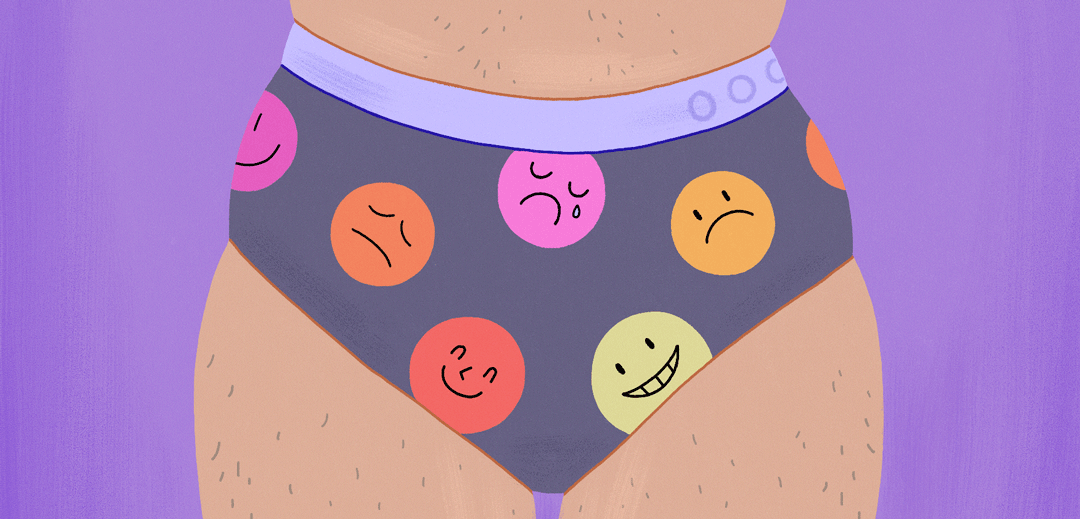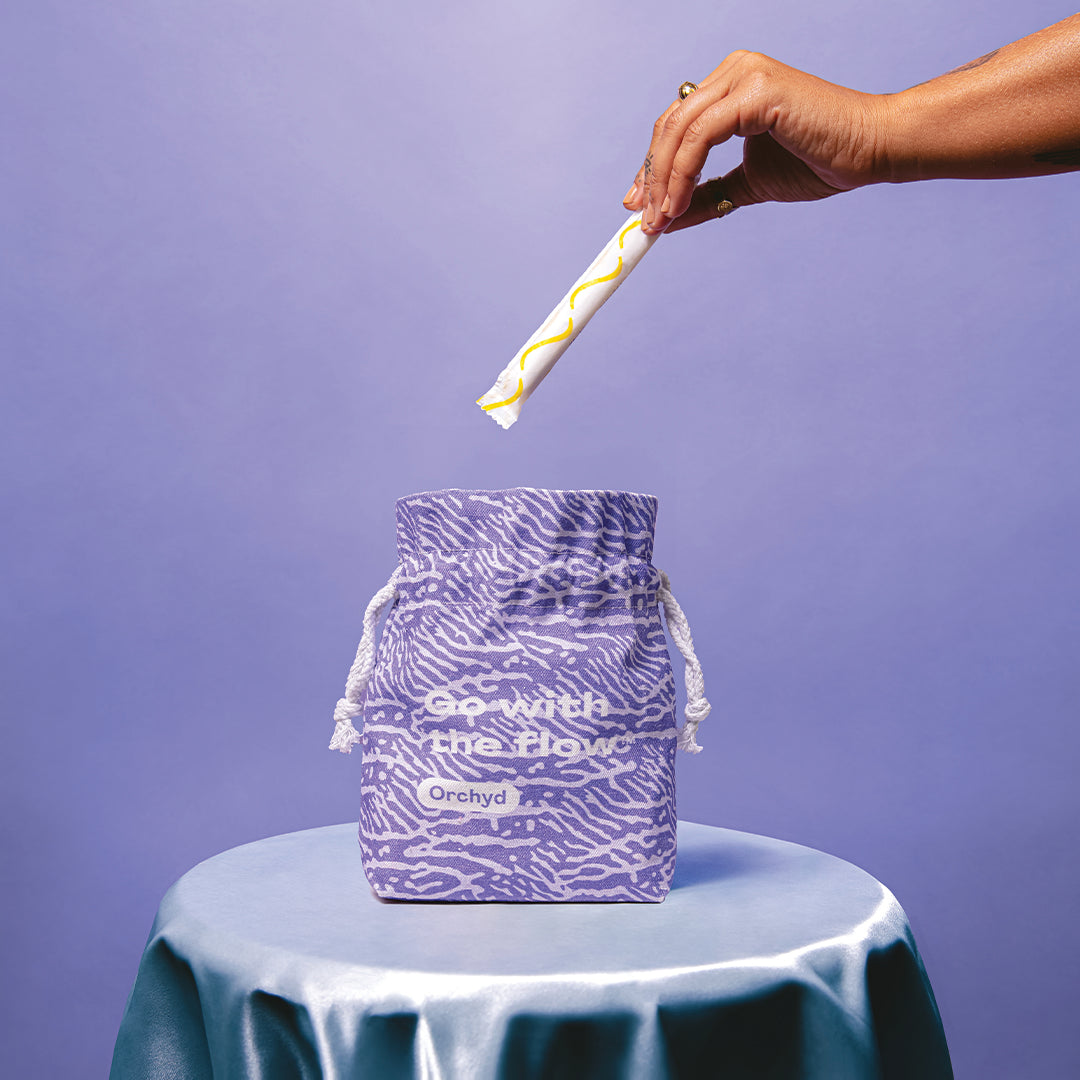
Mental Health & The Menstrual Cycle
Share
 Are you someone who's plagued by bloating, irritability, cramping, and other symptoms of premenstrual syndrome (PMS)? If so, you're certainly not alone. Over 90% of those who experience a period report getting some form of PMS, and while many can make it through their days with a slight bit of discomfort, some people's symptoms are so severe that they miss school or work. It seems that those in their 30s are most likely to have PMS, which can range from the aforementioned physical symptoms to mental health difficulties. Many find themselves battling tearfulness, mood swings, and depression just before their monthly cycles. It can be hard to deal with life when you're dealing with so many stresses and pains. Fortunately, there are some things you can do to alleviate the discomfort and mental anguish.
Are you someone who's plagued by bloating, irritability, cramping, and other symptoms of premenstrual syndrome (PMS)? If so, you're certainly not alone. Over 90% of those who experience a period report getting some form of PMS, and while many can make it through their days with a slight bit of discomfort, some people's symptoms are so severe that they miss school or work. It seems that those in their 30s are most likely to have PMS, which can range from the aforementioned physical symptoms to mental health difficulties. Many find themselves battling tearfulness, mood swings, and depression just before their monthly cycles. It can be hard to deal with life when you're dealing with so many stresses and pains. Fortunately, there are some things you can do to alleviate the discomfort and mental anguish.
What Causes PMS?
It's not exactly known what causes PMS, but it's likely the result of fluctuating levels of hormones (particularly estrogen and progesterone) that ebb and flow as your monthly cycle begins to approach. In preparation for your menstrual cycle, your body ramps up its production of sex hormones, which can cause mood swings, irritability, and anxiety. Your body's serotonin production—the chemical responsible for mood regulation—also changes just before your period, which can result in a difference in the way you feel and think.
Some people may have a history of risk factors that can make them more susceptible to enduring PMS symptoms, such as:
-
Ongoing depression or mood disorders
-
Family histories of PMS
-
Family histories of depression
-
Domestic abuse
-
Substance abuse
-
Physical trauma
-
Emotional trauma
What Are the Symptoms of PMS?
People experience a wide range of symptoms when it comes to PMS, including everything from headaches to irritability to bloating. The amount and severity of these symptoms vary from person to person, but some of the most common symptoms include:
-
Bloating
-
Breast tenderness
-
Weight gain
-
Trouble concentrating
-
Headaches/backaches
-
Skin problems/acne
-
Fatigue
-
Tearfulness
-
Irritability/aggression
-
Anxiety
-
Mood swings and/or depression
-
Joint or muscle pain
-
Headaches
-
Weight gain related to fluid retention
-
Acne flare-ups
-
Constipation or diarrhea
-
Change in libido
-
Trouble falling asleep
-
Appetite changes
-
Poor concentration
-
Alcohol intolerance
Generally, symptoms tend to come around in a pretty predictable pattern, but sometimes, you may find yourself more tearful or enduring more painful headaches than other times. One month, you might experience slightly noticeable symptoms, and the following month, you might feel like your monthly cycle is putting you through a debilitating trial. When PMS is at its worst, it can affect your daily life, making it challenging to take care of kids, study, or perform work functions. Fortunately, most PMS symptoms disappear within about four days of the start of a menstrual cycle, but the days in which the body deals with these physical and emotional changes can be quite draining.
How Does PMS Affect Mental Health?
As we talked about above, your menstrual cycle can affect the serotonin your body produces. In other words, if your serotonin levels run low because of the chemical changes occurring in your body during this time, you could experience mood changes, problems sleeping, and an overall feeling of a loss of control. People who already have underlying mood disorders could be subject to even more emotional pain during their premenstrual timeframes. Some even experience premenstrual dysphoric disorder (PMDD), which often mimics the symptoms of major depression.
However, unlike major depression, people who experience PMS or PMDD often have relief from their symptoms once their periods start. The reverse is also true. Those who have mental health conditions, such as anxiety or substance abuse disorders, are more likely to have menstrual cycles that last for fewer days. Irregular cycles are often experienced by women with eating disorders, depression, and bipolar disorder.
How is PMS Treated?
Because PMS affects both the physical and mental aspects of the body, the treatments are far-reaching. In severe cases, your doctor might prescribe antidepressants to reduce mood fluctuations. NSAIDs, nonsteroidal anti-inflammatory drugs, can also be taken to help ease cramping and breast discomfort.
When it comes to lifestyle changes, the following are a few things you can do to lessen the effects of your PMS:
Modify Your Diet
-
Eat smaller, more frequent meals to reduce the bloating and too-full sensation that can happen when you eat full meals. Keep snacks on hand that are healthy for your mind and body, such as almonds, avocado, and tuna.
-
Limit your salt intake to reduce bloating and water retention.
-
Opt for complex carbs, such as fruits, veggies, and whole grains.
-
Go for foods that are rich in calcium. If you can't digest dairy, look for daily calcium supplements.
-
Avoid caffeine and alcohol.
-
Consider alternative medicine
Have you ever thought about acupuncture or herbal remedies? Both have been around for centuries and have been said to help alleviate the stresses that come with PMS. If you've never tried acupuncture, it can seem scary at first because it utilizes stainless steel needles that are inserted into the skin at specific points. Rest assured, it's not painful, and the pain it removes from your body can often be felt many times over.
Tips for Better Mental Health During PMS
Bloating and cramps aside, PMS can do a number on your mental health. Here are some things you can do to relax your mind and ensure calmness and clarity throughout your days (and nights):
Exercise. Physical activity has been shown to boost moods and help battle depression. Exercise releases endorphins—feel-good chemicals that can help counteract hormone changes that occur during PMS. Exercise can also help get rid of those pesky cramps and reduce bloating. Consider aerobic activities such as walking, running, or bicycling to make the most of your monthly cycle's regimen.
Try Yoga. Yoga is a form of exercise, so it fits into the first category, but it's a mental challenge, too. It teaches you how to be present, ignore or recognize pain, and breathe through the difficulties you're having. You can leave your troubles outside your mat and succumb to the space you lay down on the ground.
Keep a Mood Diary. Consider recording your feelings throughout the day, especially when you're nearing the time of your period. This can help you recognize hormonal changes and mood swings so you can anticipate them and alleviate any upcoming problems.
Sleep Well. Sleep is connected to much of our health—both physical and emotional. Develop a regular sleep schedule, so your body knows when it's time to shut down and when it's time to get going again. This can help fight off irritability and brain fog.
Everyone experiences PMS differently, and many people experience PMS differently from month to month. Knowing what's causing it and what you can do about it can help ensure you get through those tough days unscathed.

